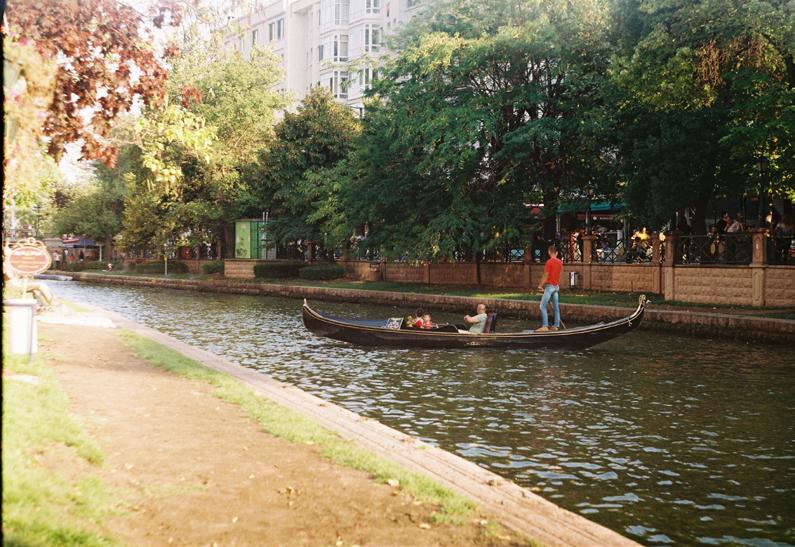
5 minute read
365+
Picture: Vladimir Jovanovski Place: Eskişehir, Turkey
As every January starts the human beings are hoping for more of literally everything. One of the most often I have heard is the beings requesting more time (for themselves, for holidays, for watching more Netflix, etc.) and most seldom to be the requests for a greener and cleaner world. So, here we are folks, the new 2020 year granting your most asked request with one extra day, February the 29th. But, let’s see what we can do with the second one which is not that naive so that receives such low importance, and let’s use that one spare day we were given this year.
Advertisement
Since the start of the 21st century, we are not able to say that we live in a peaceful and stable time. Numerous crises happened in a range from economic faults (2008) to refugees exodus to ecological cataclysms. While the first two can be solved with huge political will and compromises on the round table, the third one to me seems more of a complex problem. The year 2019 proved that we reached so far away in destroying our environment that I am afraid I would not experience the positive changes even if the solutions start to be implemented now. We were witnessing great fires last year (Amazon, Siberia, Australia), fires that obliterated natural development, order, and continuation that have evolved over eons; and gave us our most valuable products, water, and food. Thus, are we aware of where we did wrong, and are we starting to point out that mistake?
The industrial revolution was definitely a great breakthrough for humanity, with a single deadly touch. It touches nature deadly. The people of that time discovered that if the production is massive the growth is better and bigger for the price of the fertile soil and fresh drinking water. But, until when this growth is scheduled to go? Does capitalism is able to answer this question? As far as I know, it asks only for money and high productivity, for factories that will flood the markets with a tremendous amount of goods without any plan for taking care of where the surplus is going to end. That’s the reason why we are seeing rivers in Indochina lifeless, mostly done by the tanneries. Yes, jeans that we are wearing, and all that very well explained in the documentary movie ‘RiverBlue’ by conservationist Marko Angelo; make sure to watch it.
But, at the very beginning of this century, a positive sign appeared. It was in the form of a new understanding of social principles, guidelines, legislation, and activities that affect the living conditions conducive to human welfare, such as a person’s quality of life. This such movement has been presented by Michael Löwy and Joel Kovel. In Paris, September 2001, they announced ‘The Eco-socialist Manifesto’, calling it as the project of a new civilization, a new way of life, and at the same time a strategy to change the present order of things, the profit-oriented and productivist system.
Eco-socialism contains in itself the emancipatory goals and rejects both the attenuated, reformist aims of social democracy and the productivist structures of the bureaucratic variations of socialism. It insists, rather, upon redefining both the path and the goal of socialist production in an ecological framework. It does so specifically with respect to the ‘limits on growth’ essential for the sustainability of society. These are embraced, not, however, in the sense of imposing scarcity, hardship, and repression. The goal, rather, is a transformation of needs, and a profound shift toward the qualitative dimension and away from the quantitative. Personally, I would rather buy one very well crafted and locally produced product than buy the same one from a mass-production facility. Speaking of needs, we need to think twice when watching all those commercials trying to convince us that we need to possess everything popping up on the market as well as to decrease consumerism as much as possible.
Having in mind all these problems coming up recently, I cannot stop thinking that if we continue the way we do it now, we for sure will be struggling more and more, we for sure are digging our own holes, and inevitably in my mind are coming the lyrics of Pink Floyd’s song ‘Breathe’:
Back in the summer of 2017, I was doing my 2 months EVS in Ankara, Turkey. While visiting one lovely town westwards of Ankara called Eskişehir (meaning Oldtown, but actually quite new in appearance), I was convinced that yes, we actually can do better and treat our environment as a part of our closest family. The transformation of the city after the post-industrial decline and a natural disaster was nothing less but a painstaking process, however ‘Rome wasn’t built in a day’. In 20 years time, the town reached to be one of the finalists for the WRI Ross Prize for cities (global award celebrating and spotlighting urban transformation) and to be called the Venice of Turkey; its plan and integration I am sharing it with you here: https://www.youtube.com/ watch?v=tIhAG0wJXuY
So, without further ado let’s consider this upcoming movement as a way to protect the future devastation of our colorful world. Let’s focus on using the already available ways to make our homes and needs more sustainable through investments in technologies that would use natural power and give us clean energy. We for sure have learned from our past that going against nature means that we go against ourselves. Some countries that have adopted and enacted socialist ideas and policies, and have seen success in improving their societies by doing so, are Norway, Finland, Sweden, Denmark, Great Britain, Canada, the Netherlands, Spain, Ireland, Belgium, Switzerland, Australia, Japan, and New Zealand.
Shall we follow them suit?

